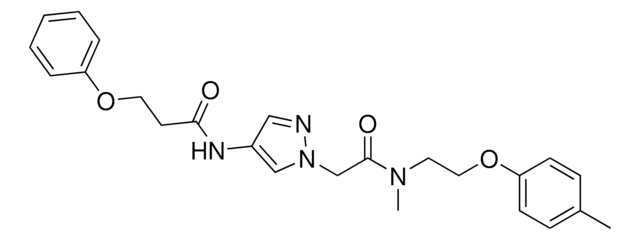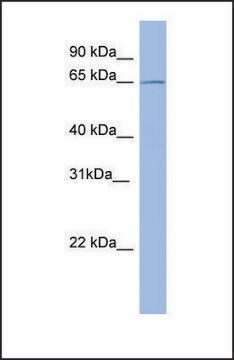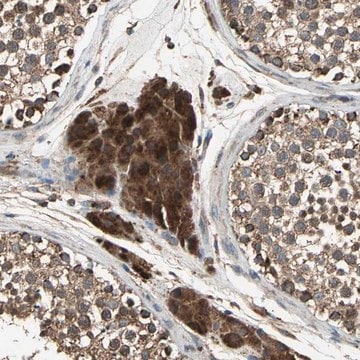추천 제품
생물학적 소스
rabbit
결합
unconjugated
항체 형태
affinity isolated antibody
항체 생산 유형
primary antibodies
클론
polyclonal
형태
buffered aqueous solution
분자량
antigen 50 kDa
종 반응성
rat, human, mouse
포장
antibody small pack of 25 μL
농도
~1 mg/mL
기술
immunoprecipitation (IP): 1-2 μg using HeLa cell lysates.
western blot: 0.5-1 μg/mL using 3T3 or Rat1 cell extracts.
UniProt 수납 번호
배송 상태
dry ice
저장 온도
−20°C
타겟 번역 후 변형
unmodified
유전자 정보
human ... ETF1(2107)
mouse ... Etf1(225363)
rat ... Etf1(307503)
일반 설명
Eukaryotic translation termination factor 1 (eRF1) is a protein encoded by the ETF1 gene in humans. It belongs to eRF1 family and the amino-acid sequence is highly conserved.
애플리케이션
Anti-eRF1 antibody produced in rabbit has been used in western blotting and immunoprecipitation.
생화학적/생리학적 작용
Eukaryotic translation termination factor 1 (eRF1) proteins are directly implicated in the termination of translation in eukaryotes. It plays an important role in the termination of protein synthesis, which is performed by three domains (N, M and C) of eRF1. Rearrangement in eRF1 leads to N-domain accommodation into the ribosomal A site.
물리적 형태
Solution in 0.01 M phosphate buffered saline, pH 7.4, containing 15 mM sodium azide.
면책조항
Unless otherwise stated in our catalog or other company documentation accompanying the product(s), our products are intended for research use only and are not to be used for any other purpose, which includes but is not limited to, unauthorized commercial uses, in vitro diagnostic uses, ex vivo or in vivo therapeutic uses or any type of consumption or application to humans or animals.
적합한 제품을 찾을 수 없으신가요?
당사의 제품 선택기 도구.을(를) 시도해 보세요.
Storage Class Code
10 - Combustible liquids
Flash Point (°F)
Not applicable
Flash Point (°C)
Not applicable
개인 보호 장비
Eyeshields, Gloves, multi-purpose combination respirator cartridge (US)
시험 성적서(COA)
제품의 로트/배치 번호를 입력하여 시험 성적서(COA)을 검색하십시오. 로트 및 배치 번호는 제품 라벨에 있는 ‘로트’ 또는 ‘배치’라는 용어 뒤에서 찾을 수 있습니다.
Identification and characterization of a novel ubiquitous nucleolar protein `NARR?encoded by a gene overlapping the rab34 oncogene
Zougman A, et al.
Nucleic Acids Research, 39(16), 7103-7113 (2011)
Cosuppression of eukaryotic release factor 1-1 in Arabidopsis affects cell elongation and radial cell division
Petsch K, et al.
Plant Physiology, 139(1), 115-126 (2005)
Toshiaki Shigeoka et al.
Nucleic acids research, 40(14), 6887-6897 (2012-05-05)
Upf1 is a highly conserved RNA helicase essential for nonsense-mediated mRNA decay (NMD), an mRNA quality-control mechanism that degrades aberrant mRNAs harboring premature termination codons (PTCs). For the activation of NMD, UPF1 interacts first with a translation-terminating ribosome and then
Leo E Wong et al.
Nucleic acids research, 40(12), 5751-5765 (2012-03-03)
Translation termination in eukaryotes is catalyzed by two release factors eRF1 and eRF3 in a cooperative manner. The precise mechanism of stop codon discrimination by eRF1 remains obscure, hindering drug development targeting aberrations at translation termination. By solving the solution
Polina Kryuchkova et al.
Nucleic acids research, 41(8), 4573-4586 (2013-02-26)
Release factor eRF1 plays a key role in the termination of protein synthesis in eukaryotes. The eRF1 consists of three domains (N, M and C) that perform unique roles in termination. Previous studies of eRF1 point mutants and standard/variant code
자사의 과학자팀은 생명 과학, 재료 과학, 화학 합성, 크로마토그래피, 분석 및 기타 많은 영역을 포함한 모든 과학 분야에 경험이 있습니다..
고객지원팀으로 연락바랍니다.








